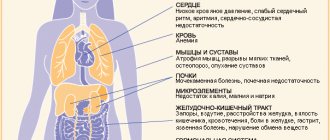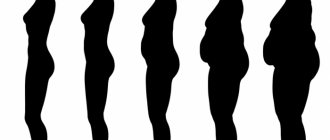Nowadays, excess weight is a global problem for many countries. But this serious disease is treatable. It will depend on the degree of obesity.
There are 3 degrees of obesity. The third is the most dangerous. After all, there is already a whole bunch of serious diseases. Of course, the first degree of obesity is easily treatable. Therefore, it is better not to bring it to the second, and especially the third stage. However, even here, with proper treatment, a positive result with weight normalization is possible.
What does stage 3 obesity mean?
Excess weight is a serious problem that significantly impairs the quality of life of men, women and children. If an extra 2-3 kg may not be particularly noticeable, then the presence of 20-30 kg of body fat is a reason to consult a doctor.
Obesity is a serious disease that occurs in people who abuse fatty foods, lead a sedentary lifestyle, or have certain diseases, such as pathologies of the endocrine system. Also, the disease can be caused by taking hormonal drugs - these are the main reasons for the appearance of excess weight.
This pathology can be observed in men, women and children. Most often it occurs in women due to hormonal surges caused by pregnancy, breastfeeding, taking hormonal medications, menopause and menopause.
The presence of pathology in a child can be caused by an emotional state when peers do not want to communicate with him, or the opposite sex does not pay attention. As a result, the child or teenager “eats” his problems, which leads to the appearance of excess body weight.
Other factors include:
- heredity;
- psychogenic overeating;
- failure of metabolic processes;
- depressive and stressful conditions;
- serious pathologies of the cardiovascular system, gastrointestinal tract, liver;
- consuming more calories per day than you burn.
What is third degree obesity and how many kg is it? Based on medical data, this degree includes the presence of excess weight when the BMI (body mass index) exceeds 40 points. According to ICD 10, this disease has code E66.
The following formula is used to calculate BMI:
I = m (weight) / h2 (height)
where weight in kilograms is divided by height in meters squared. If the amount exceeds 40, then the person has the third stage of obesity.
It is difficult to answer the question, stage 3 obesity - how many kg, since each case is individual. For example, if a person is 180 cm tall and weighs 126 kg, then the BMI will be 38.8, which refers to stage 2 obesity. If the patient does not begin treatment at this stage, the pathology will progress to stage 3 obesity.
The table below shows BMI indicators:
BMI indicator in the table
Lack of treatment can lead to various consequences that will negatively affect both the patient’s health and his moral character. That is why you should not delay therapy, but should start it as quickly as possible, especially if you have already been diagnosed with stage 1 obesity.
Is it possible to overcome obesity? Yes! But you will have to put a lot of effort and patience into this.
Classification
Depending on development factors, obesity is divided into primary and secondary. Primary is observed in almost 95% of patients, its forms:
- nutritional-constitutional (arises due to genetic predisposition);
- mixed;
- with violation of food standards.
Secondary can be:
- endocrine-metabolic;
- due to mental illness;
- taking psychotropic medications;
- with genetic defects;
- cerebral.
Based on their anatomical structure, the following types are distinguished:
- android - male type (“apple” shape), fat deposits are deposited in the upper part of the body;
- gynoid - “pear-shaped” shape, fat accumulates in the hips and buttocks;
- mixed - fat deposits are evenly distributed throughout the body.
Experts identify the following forms of obesity:
- Morbid is the last stage of completeness, which can only be eliminated surgically.
- Exogenous-constitutional - occurs due to overeating, national characteristics, gastronomic culture in the family. Also, its development is influenced by slow metabolism and heredity.
- Alimentary - the second name of this form is “trunk”, refers to the primary one. Due to an imbalance between calories consumed and calories expended, fat accumulates both on the body and around internal organs. In the third stage of obesity, this form indicates the neglect of the disease, as a result of which the liver, cardiovascular system and heart suffer. As a rule, the main factor is hereditary factor.
"Heptral": instructions
Heptral is a French medicine for fatty liver. The name of the active substance is ademeteonine. One tablet contains 400 mg. The same dosage of the active component is also available in 5 ml ampoules. The lyophilisate for preparing the solution is suitable for both intramuscular and intravenous administration to patients.
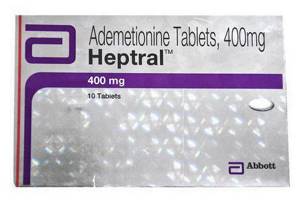
The drug has a detoxifying, choleretic, hepatoprotective, antioxidant and cholekinetic effect on the body. In addition, the manufacturer claims that the active substance has neuroprotective, antidepressant and antifibrosing properties. The medication is able to enhance the secretion of bile and compensate for the lack of adenosylmethionine (coenzyme).
The drug is prescribed for fatty hepatosis, chronic hepatitis, liver intoxication, encephalopathy, angiocholitis. Genetic disorders that affect the adenosylmethionine cycle and cause homocystinuria or hyperhomocysteinemia are contraindications for the use of Heptral.
Symptoms
Obesity can be identified by the following signs:
- BMI is significantly higher than normal;
- the appearance of shortness of breath during any physical activity;
- significant increase in body weight;
- increased sweating;
- the emergence of psychological problems due to appearance;
- the formation of various diseases, including oncology;
- problems with the reproductive system;
- decreased performance;
- hypertension;
- disruption of internal organs;
- weight does not decrease even if a person restricts himself in nutrition;
- complete dependence on food and an increase in the number of meals.

Photos of obesity in men
Description of the drug "Liv-52"
The medicine for fatty liver "Liv-52" is a hepatoprotector based on herbal components. The active ingredients used are chicory seeds, prickly caper roots, yarrow, cassia seeds, tamarix and black nightshade. The listed components are specially treated with steam from a mixture of other plant extracts.
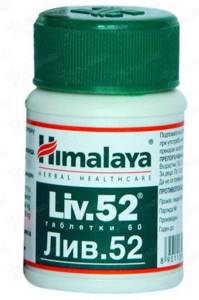
The drug is produced in the form of tablets and dark brown drops for oral use. The combined herbal medicine has choleretic, hepatoprotective, anti-inflammatory and antioxidant effects. With its help, it is possible to block the development of degenerative and fibrotic changes, activate intracellular metabolic processes and restore hepatocytes.
Indications for prescribing herbal medicine are pathologies such as fatty hepatosis, hepatitis of various origins, and cirrhosis of the liver. You can also take Liv-52 as a cure for obesity. In pharmacies, the average cost of a medicine is 380-450 rubles.
The medication in the form of drops can be prescribed for preventive and therapeutic purposes to children over 2 years of age. It is prohibited to use Liv-52 during pregnancy and lactation, as well as in case of hypersensitivity to the components of the product.
Treatment
You should start therapy only after a diagnosis has been made by a specialist. In this case, complex treatment with medications, a special diet, exercise therapy, and surgery is prescribed.
Let's look at each method in more detail.
Drug treatment
As a rule, the following drugs are prescribed for obesity:
- Xenical;
- Sibutramine-containing medications: Reduxin, Lida;
- Adiposine;
- Lorcaserin;
- Acomplia;
- Fepranon, Regenon;
- Liraglutide, Victoza;
- Simlin;
- Exenatide Baeta et al.
These medications help cope with the feeling of hunger, giving a false feeling of fullness, affecting the centers of the brain. Some of these medications reduce the absorption of fats in the intestines. But at the same time, most of these drugs do not give any result in stage 3 obesity. In addition, many of them have side effects.
The doctor may also recommend treatment with folk remedies, but whether they will have an effect is unknown.
List of folk remedies:
- to reduce appetite - nettle, motherwort, kelp, wormwood;
- for burning fat - ginger, rose hips, green tea, guarana;
- to cleanse the intestines - decoctions and infusions based on chamomile, St. John's wort, immortelle, birch buds;
- having a laxative effect - fennel, prunes, senna, dried apricots.

Photos of obesity in women
Diet
At the treatment stage, an important condition is diet correction. Usually the specialist prescribes Pevsner table No. 8. You should also follow these nutritional rules:
- You should eat 5-6 times a day and at the same time.
- The daily requirement of clean water is at least 1.5 liters.
- You should remove from your diet all fatty, sweet, flour, confectionery, salty and smoked products, as well as carbonated and sweet drinks.
- Eat healthy and balanced, limit the amount of fats and carbohydrates you consume, increase the amount of protein and fiber in your diet.
- Once a week, arrange fasting days.
- Start counting calories: the daily intake should not exceed 1500 kcal (note the 1500 calorie diet). And even in this case, it is recommended to reduce this level to 1200 kcal.
- Your diet should always include fresh vegetables and fruits, but grapes and bananas are prohibited.
- Complete restriction of alcohol consumption.
- Drinks allowed include unsweetened green tea, pure still water, and freshly squeezed juices from vegetables or fruits.
- You should eat like this: for breakfast - carbohydrates (pasta or porridge), for lunch and dinner - protein foods (low-fat cottage cheese, boiled eggs, lean meats and fish).
A sample strict diet menu for the day is as follows:
- breakfast - black coffee without sugar, 150 g of cottage cheese 0% fat;
- snack - green apple;
- lunch - apple mousse, carrot salad, vegetable soup cooked in chicken broth;
- afternoon snack - 200 ml kefir 0% fat;
- dinner - rosehip broth, seafood salad.
Sample menu of a gentle diet for 1 day:
- breakfast - black coffee without sugar, 2 egg omelette, 150 g of lean boiled beef, 50 g of hard cheese with whole grain bread;
- snack - 0.15 kg of fruit salad;
- lunch - unsweetened green tea, 1 whole grain bread, 150 g boiled chicken breast, vegetable stew, puree soup;
- afternoon snack - oatmeal cooked with low-fat milk;
- dinner - low-fat steamed sea fish, 200 ml of kefir, vegetable salad, 50-70 g of brown rice.
If desired, the diet can be followed for a week. These foods should be eaten in 5-6 meals, and you should also drink rosehip decoction; if you wish, you can drink unsweetened black coffee with milk, but no more than 2 mugs. Sample menu:
- Monday - boiled vegetables as a side dish, 350 g of boiled chicken breast;
- Tuesday - boiled beets, broccoli, carrots or celery root;
- Wednesday - 150 g of hard cheese, 2 kg of green apples;
- Thursday - drink a glass of milk, kefir or low-fat yogurt every 2 hours;
- Friday - eat 0.3 kg of sour cream in 3 doses;
- Saturday - 30 g of boiled rice, 300 g of boiled sea fish;
- Sunday is a fasting day, during which you need to drink a lot of water.

Moderate physical activity has a positive effect on obesity
Exercises
No less effective in the treatment of obesity is exercise therapy, which normalizes metabolic processes, strengthens muscles and restores physical activity. At the same time, physical therapy is adaptive in nature, taking into account chronic diseases and gradual involvement in systematic exercises.
You should start the exercises with a 10-minute warm-up and measured walking. Warm-up consists of turns, bends and rotation of the head, bends in different directions, exercises for the joints of the hands, elbows, forearms and feet. After this, you need to start walking slowly (no more than 3 km per hour).
Walking is gradually being replaced by dosed running with increasing distances, as well as training on exercise machines. Running for 3 minutes should be alternated with walking. After which you need to rest a little and repeat the exercises. You should also take short breaks during exercise.
Surgical intervention
Another method of dealing with stage 3 obesity is gastric surgery, which consists of:
- bandaging;
- reducing the volume of the stomach using a special balloon;
- bypass, including biliopancreatic.
Only the doctor will tell you which operation will be performed, based on the tests and the patient’s condition. Treatment may be complicated by concomitant diseases requiring separate therapy.
Means "Xenical"
Another medicine based on orlistat is Xenical. The medicine is produced in Switzerland, which significantly affects its cost. You can buy a medicine for obesity for 2300-2700 rubles. "Xenical" is available in the form of gelatin capsules, turquoise in color.
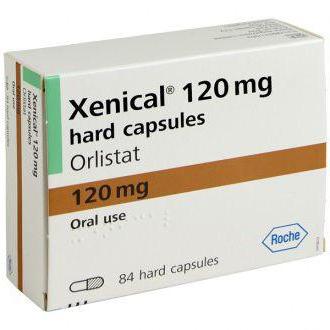
According to the instructions, the drug can affect enzymes in the gastrointestinal tract that promote the digestion and absorption of fats, that is, lipase. A significant advantage of Xenical is its minimal systemic exposure. The drug can be taken for quite a long time by patients who have problems with excess weight and high glucose levels. In addition to taking the medication, you will need to adhere to a low-calorie diet and engage in moderate physical activity.
Take Xenical three times a day, one capsule (120 mg) with meals. The duration of treatment and the need to adjust the daily dosage is determined only individually.
Pregnancy with obesity
Any stage of obesity negatively affects both reproductive functions and the course of pregnancy itself. The third degree of obesity when carrying a child is dangerous because it entails the development of:
- gestational diabetes;
- hypertension;
- thrombosis;
- apnea;
- sleep disorders;
- genitourinary system infections;
- problems with labor.
Also, such a condition can lead to miscarriage or post-term pregnancy. All of these factors negatively affect the condition of the pregnant woman. But at the same time, excess body weight in a pregnant woman also negatively affects the unborn child, this is expressed in the following:
- the newborn child has high body weight, which in the future may lead to obesity;
- high probability of congenital pathologies, for example, diabetes or heart disease.
The normal weight that a plump woman can gain during the period of bearing one child is 5-9 kg, two or more children - 11-19 kg. At the same time, specialists closely monitor the condition of the expectant mother throughout pregnancy, conducting certain studies if necessary.
Side effects
The manufacturer lists frequent side effects as urgency to defecate, loose stools, flatulence, and abdominal discomfort. To avoid such unpleasant phenomena, you should definitely limit your consumption of fatty foods. Only 2% of patients suffering from diabetes mellitus exhibited a hypoglycemic state. Allergy to the active substance may occur in the form of urticaria, itching, and redness of the skin. More serious cases are rare: bronchospasm, angioedema.
Do they take you into the army?
Many overweight conscripts are interested in the question of whether they will be accepted into the army. At the third stage of obesity, a conscript can fall into both group “B” and “G” (these categories determine the degree of suitability of the future soldier for subsequent service).
Group “B” means the status of limited fitness, which implies release from the army in peace, and in case of martial law, the conscript is enrolled in the 2nd queue.
Category “G” implies the status of “temporarily unfit,” which means that the conscript has pathologies that can be treated (fractures, obesity, etc.). In this case, a six-month deferment is provided, which can be extended if necessary.
If the third stage of obesity was first identified during military training, then the conscript is assigned to category “G”, as a result of which a deferment is given for 6 months. If necessary, a second opinion is issued. If treatment does not bring results, the conscript falls into category “B”.
During the deferment, the conscript must lose weight so that his body weight becomes standard, based on height and weight. At the same time, the military registration and enlistment office cannot force a man to undergo treatment. If a conscript has no desire to undergo treatment, he may refuse therapy.
Also, category “B” is issued in the presence of persistent moderately severe disorders that have developed against the background of moderate endocrine system diseases: diabetes mellitus, manifest hypothyroidism, angiopathy, etc.

Proper and balanced nutrition is the key to a slim figure and good health
Reviews of the drug "Liraglutide"
The hypoglycemic anti-obesity drug Liraglutide is used to treat type 2 diabetes mellitus and chronic obesity. The product is approved in many countries only in the form of the drug “Victoza” (Denmark). Another trade name of the drug, Saxenda, appeared on the pharmaceutical market in 2015 and positions itself as a drug that helps fight excess weight in adult patients.

"Liraglutide" is a synthetic copy of glucagon-like peptide-1, which is produced in the human intestine and actively acts on the pancreas and stimulates the production of insulin. The body is unable to distinguish between a natural and an externally introduced enzyme. The use of the drug allows you to gradually establish the natural production of insulin and reduce sugar levels. This, in turn, normalizes the absorption of nutrients from the foods consumed.
Reviews from patients confirm that the drug has a pronounced therapeutic effect. The product is quite convenient to use, because it has the shape of a syringe pen, on which divisions are applied, allowing you to accurately calculate the dosage. The medicine is injected into the shoulder, thigh or abdomen area. This anti-obesity medicine can be purchased in pharmacies only with a prescription.
The cost of drugs based on liraglutide ranges from 9,500 (Victoza, 2 syringes) to 27,000 rubles (Saxenda, 5 syringes). Specialists do not often use these medications to treat patients with diabetes and obesity due to the high cost.
Recommendations
Successful treatment largely depends on how correctly the recommendations of the attending physician were followed. When you are diagnosed with stage 3 obesity, you do not need to become despondent, but rather pull yourself together. If treatment is carried out at home, then you need to follow these tips:
- Sign up for swimming in the pool, do it under the supervision of a doctor or trainer. It is important to monitor your blood pressure and pulse.
- Try to move more, avoid using the elevator if possible, and take regular walks in the fresh air.
- Exercise every morning. At the initial stage, its duration can be no more than 5 minutes, but gradually the duration of training should be increased.
- Ventilate your home regularly.
- If obesity is detected due to mental disorders, make an appointment with a psychologist.
- Get enough rest; sleep should be at least 7 hours.
- Do not self-medicate under any circumstances, as this can lead to stage 4 obesity or even worse health.
Prognosis and prevention
With grade 3 obesity, the patient receives disability (group 2–3); without treatment, the disease progresses and is fatal due to complications in the heart and vascular pathologies. The primary form responds well to therapy, the extra pounds disappear in 1–1.5 years. In patients with the secondary type, treatment reduces weight and maintains it at a safe level. Basic preventive measures:
- balanced diet with a predominance of plant foods and lean protein;
- elimination of stress factors;
- active lifestyle.
Consequences
What are the dangers of stage 3 obesity? It can lead to the following complications:
- hormonal imbalance;
- problems with conception;
- short-term cessation of breathing;
- atherosclerosis;
- development of cancer;
- disruption of the gastrointestinal tract;
- diabetes;
- sexual disorders;
- renal failure;
- increased risk of sudden death;
- a state of prolonged depression that can lead to suicide;
- reluctance to communicate with other people.
Obesity of the 3rd degree is a serious pathology that worsens the quality of life and causes many new diseases. It is for this reason that you should start treatment as soon as possible and believe in the results! Only in this case everything will work out!
Diagnostics
If you are overweight, you need to seek help from nutritionists and endocrinologists. Anthropometry is used to diagnose the disease.
To do this, you will need data regarding waist, chest and hips, as well as weight and height. As a result, it is possible to determine the degree and type of obesity and the location of fat deposits.
To find out the reasons that led to the pathology, the specialist asks the patient about his diet and the amount of food consumed.
As a result, it will be possible to determine the cause of obesity:
- hormonal disorder;
- poor nutrition;
- metabolic failure.
Based on this, effective therapy is prescribed.
To determine more precise causes, auxiliary examinations may be needed:
- tests for thyroid hormones;
- blood biochemistry (will determine the state of protein, carbohydrate and fat metabolism), urine and blood analysis (will reveal glucose levels);
- tests that determine concomitant diseases;
- ECG, MRI, X-ray, ultrasound, which will allow you to evaluate the effect of excess weight on the functioning of internal organs.

Differential diagnosis is carried out with Itsenko-Cushing's disease, which is characterized by similar symptoms.






